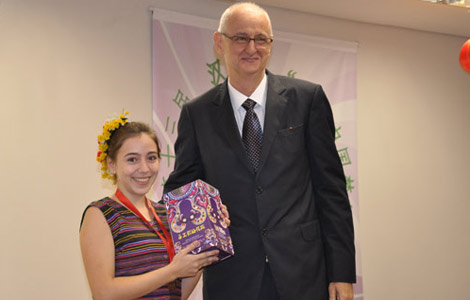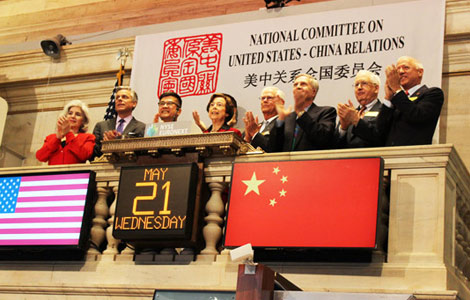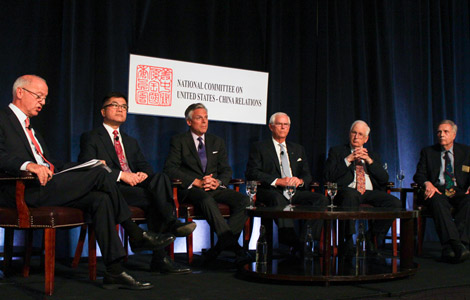Solid waste smuggling sees threefold rise
Updated: 2014-05-27 07:33
By Zhang Yan (China Daily)
|
||||||||
Chinese Customs intercepted 221 instances of smuggling involving solid waste last year, a threefold increase from 2012, a senior anti-smuggling official from the General Administration of Customs said.
Authorities confiscated 976,500 metric tons of illegal waste material last year, an increase of 150 percent from 2012.
"Our intensified efforts and huge price differences for waste disposal between China and some developed countries contributed to the sharp increase in discoveries of solid waste being smuggled into China," said Xu Wenrong, deputy director of the General Administration of Customs.
The high cost of waste disposal has pushed some developed countries to discard their waste in developing countries, where illicit importers sort the material for large profits, he said.
The imported solid waste includes recyclable and non-recyclable materials. Recyclable items include discarded steel and iron, which may be imported with the relevant permits.
Non-recyclable items range from coal slag, chemicals and electronic waste to old clothes, building materials and medical waste. Imports of these are strictly prohibited.
"The smuggling of foreign trash seriously pollutes the environment and brings great harm to public health; we will crack down on such crimes," Xu said.
Guan Xiangying, director of the administration's investigation department, said most of the confiscated foreign trash came from the United States, Europe and Japan.
Smugglers collude with their overseas counterparts, who declare the items as "other articles" to pass customs checks and transport them to the Chinese mainland on large shipping containers, Guan said.
The items are sometimes hidden in other cargo and sent across porous border areas, such as those between China and Vietnam, or the Beilun River and Beibu Bay in the Guangxi Zhuang autonomous region.
To avoid arrest, smugglers also traverse frontier areas in northeastern China instead of the more commonly used southeastern coastal areas, he said.
Early last year, customs officials in Guangzhou, capital of Guangdong province, and Dalian in Liaoning province unearthed a major operation smuggling electronic waste. They confiscated more than 2,500 tons of items and arrested 54 suspects, according to the administration.
The administration said smugglers purchased the waste from Japan, the US and Europe, and shipped the materials via Hong Kong.
The suspects then transported the items north to Liaoning province to be smuggled across the border, according to the administration.
In recent years, smuggling activities have become more intelligently planned and professional, and involve strong networks, which makes the department's discovery and evidence collection more difficult, Xu said.
Smuggling rings are also often operated by criminal gangs and the activity has become intertwined with other illegal behavior, including false trading, money laundering, tax evasion and false tax declarations, he added.
The authorities will focus on combating major cases involving contraband smuggling, including the smuggling of drugs, firearms and solid waste, and cracking the networks involved.
Customs officials at multiple levels should enhance cooperation with other departments, such as environmental protection agencies, quality supervision and inspection and public security sectors to conduct joint crackdowns, Xu said.
zhangyan1@chinadaily.com.cn

 Documenting reaching fame the hard way
Documenting reaching fame the hard way
 US president pays surprise visit to Afghanistan
US president pays surprise visit to Afghanistan
 Forum discusses strategies to realize Africa's promise
Forum discusses strategies to realize Africa's promise
 South America is prime market for Chinese automakers
South America is prime market for Chinese automakers
 Brazil names winners for 'Bridge' finals
Brazil names winners for 'Bridge' finals
 37,000 US flags planted in Boston for Memorial Day
37,000 US flags planted in Boston for Memorial Day
 The multibillion-dollar house that Jack built
The multibillion-dollar house that Jack built
 Highlights of New York Forum Africa
Highlights of New York Forum Africa
Most Viewed
Editor's Picks

|

|

|

|

|

|
Today's Top News
US urged to explain cyberspace spying
Xinjiang's stability a top priority
Beijing subways to get 4G coverage
Anti-terror campaign launched
China lifts shellfish ban
Children from China enroll in US summer academic camps
Obama pays surprised visit to Afghanistan
Senator to renew gun control push
US Weekly

|

|







